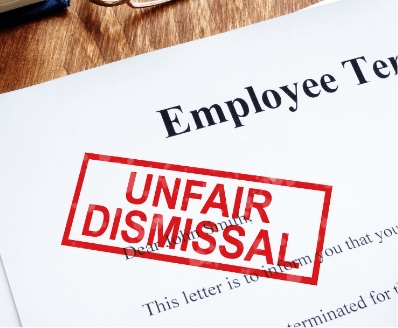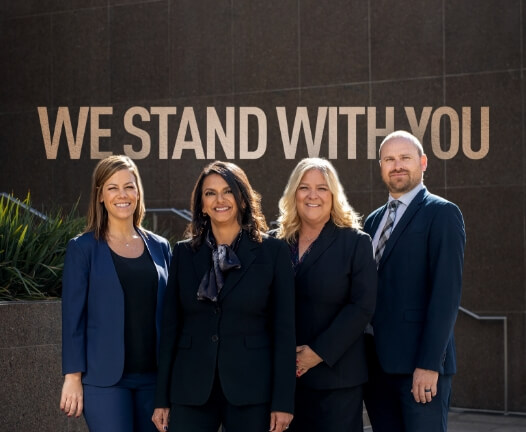San Diego
Disability
Attorneys
San Diego Disability Attorneys

Both federal and state laws protect the rights of individuals with disabilities to work, as long as they can perform essential functions of a job. Disability anti-discrimination laws prohibit employers from taking adverse action against an applicant or employee due to a real or perceived disability. In addition, the law requires employers to make reasonable accommodations so that disabled employees can continue to work with their conditions.
The San Diego disability discrimination attorneys at Haeggquist and Eck, LLP can provide the advocacy you need to ensure that you can work and continue supporting your family through reasonable accommodation for your disability—and if not, to collect fully on your damages. No person deserves to experience unlawful discrimination in the workplace or have an employer refuse accommodations when they are reasonable, and we are here to fight for your rights and ensure your ability to support your family.
Adverse Employment Actions Due
Due to Disabilities
The first component of anti-discrimination disability laws prevents employers from basing employment decisions or taking adverse action against an employee because of a disability. This disability can be real or perceived, physical or mental, but the employee must have a condition—or the employer believes they have a condition—that the law protects as a qualified disability.
Employers cannot lawfully:
-
Ask about disabilities on job applications
or in interviews -
Require medical exams unless certain
circumstances exist -
Terminate an employee who develops
a disability
-
Refuse a deserved promotion or pay increase
due to a disability -
Demote, cut hours, or unfavorably transfer an
employee because of their disability -
Refuse to allow someone to work in a
consumer-facing position due to their disability
To be clear, an employer can fire or refuse to hire someone with a disability for other reasons not related to the disability. It can often be difficult to know when an adverse employment decision was discriminatory or not, and this is where our San Diego discrimination attorneys can help. If you have a discrimination claim, we can help you seek compensation for any losses you experienced because of your employer.
Can an Employer Fire an Employee
for Pregnancy?
If you live your everyday life with a mental or physical disability that requires reasonable accommodation, you must notify your employer if it is not obvious to them. Once your employer receives notice that you requested accommodations, they then must make the reasonable accommodations that you require to work.
Under the California Fair Employment and Housing Act (FEHA), when an employer has more than five employees, they must provide reasonable accommodations for individuals with a physical or mental disability. The reasonable accommodation must enable you to perform the essential functions of the job unless it would cause undue hardship for the company.
Employers can seek out information on how to make such accommodations through the California Department of Rehabilitation, which explains how covered employers must adapt the job to disabled employees to enable them to work productively. If you had an issue with your reasonable accommodation request with your employer, you may seek damages and protection under FEHA or the federal Americans with Disabilities Act (ADA).

What Reasonable Accommodations Might You Obtain
For Your Disability?
When you have a disability that affects your ability to work, and you notify your employer, they might have to provide you with reasonable accommodations so you can properly perform your job.
Reasonable accommodation for a disabled employee can include:
- Changing the duties of the job
- Providing leave to receive medical care
- Changing your work schedule to accommodate the disability
- Relocating the work area to facilitate work around the disability
- Providing aid through mechanical or electrical means
- Provide or adjust equipment, software, or products to facilitate work production
- Alter or change existing job tasks
- Provide reserved parking to facilitate access to work
Reasonable accommodation requests can also lead to the acceptance of your service animal in the workplace, the use of alternate formats for important company materials, and even daily checklists provided by your employer to facilitate your efficient work while managing your disability. You might also have the opportunity for reassignment to a vacant or new position that you are qualified for if you can no longer perform the requirements of your current position.
Reasonable Accommodation Requests
Under California Law
In the State of California, it is against the law for your employer to fail to engage in a timely, good faith, and interactive process regarding accommodation requests. The purpose of this process is to knock down barriers that might be in place to keep people from performing jobs that they can perform with some form of accommodation.
Each situation is unique, and the process demands an individualized assessment of both the job as well as the specific physical or mental limitations of the individual with the need for reasonable accommodation. When your employer refuses to engage in an open dialogue and instead simply refuses your request, they violate the law, and you deserve compensation for any losses you incur as a result.
The process through which your request moves must be both interactive and in good faith. Your employer cannot simply refuse accommodations, provide no reason, and move on without providing any explanation. On the other hand, if your employer needs additional information from you, the interactive requirement means that you must provide it.
The employer and their attorneys are looking for specific things to deny your request, and you are at a disadvantage if you do not have an attorney of your own advocating for your best interests. Reach out to an experienced San Diego disability attorney at Haeggquist & Eck now to learn about options in your case.
To help you support open and interactive communication with your employer about your disability and the reasonable accommodation you need to work, there is a package in California. The Department of Fair Employment and Housing (DFEH) offers a sample Request for Reasonable Accommodation package to help assist employees and employers in engaging in the interactive process.


While the law does not require the use of the form for your request for reasonable accommodation, it can help you with organization and ensure you put forth your request in accordance with the law. It is important to remember that using these forms does not insulate employers from liability or create a presumption that discrimination did not occur. They can just be helpful to employers and employees alike in the process. Looking at the forms will also help you to understand the depth of information needed with your request.
Knowing what information you should present can help you assemble what you need to begin the process, but unless you have worked on other reasonable accommodation disability denial cases, it is not likely you know what the employer and its attorneys are looking for to deny your claim.
An experienced disability discrimination attorney does know these things and can put that experience to work to ensure that your reasonable accommodation request receives appropriate assessment and attention. Our legal assistance can support your receipt of either accommodations or compensation for your lost earnings if your employer wrongfully denied your request.
When Should I Contact a Disability Lawyer in My Reasonable
Accommodation Process?
The benefit of having a disability attorney on your side can be immediate and valuable if you experienced discrimination. Your disability must meet certain criteria to qualify for legal protection, and your employer must meet certain criteria to have to provide you with reasonable accommodation.
The unique facts and circumstances of your case, and the quality of your evidence, will determine the outcome of your request. Having a disability lawyer helping you through the process of requesting accommodations can support the initial success of your request.
If your employer wrongfully denied your reasonable request for accommodation and you cannot perform your job and ensure losses, you may have the right to seek damages. Your disability attorney can pursue compensation for the lost wages and future earnings that the wrongful denial will result in, leading to the fullest possible compensation for your losses.
Both California law and the ADA protect your right to receive reasonable accommodations in qualifying circumstances, and Haeggquist & Eck are here to ensure you receive what the law entitles you to.

Connect With a San Diego
Disability Discrimination Attorney Now
to Discuss Your Situation
Having an experienced discrimination attorney on your side is critical if you plan to allege disability discrimination against your employer or a potential employer. Your disability should not result in you losing your job or reassignment to a less productive position when your employer can put reasonable accommodations in place so you may continue working.
The process of challenging disability discrimination can be complex and might require court action. An employment attorney on your side will even the playing field and support the best possible outcome and fullest legal recovery possible.Reach out to Haeggquist and Eck now at (619) 342-8000 for your free case evaluation to discuss your disability discrimination or accommodation concerns. We’re ready to help employees in your position.
When you need a disability attorney in San Diego on your side, contact Haeggquist & Eck, LLP online or call (619) 342-8000. We offer free case evaluations to help you understand how our services can work for you.
Which Accommodations Are
Considered Reasonable?
If you have a mental or physical disability and work for an employer with 15 or more employees, there are a number of accommodations for you that may be considered acceptable.
You can reasonably request the following and more of an employer:
- Improve workspace accessibility
- Change how presentations and training materials are delivered
- Provide or adjust a product, software, or equipment
- Alter or change job tasks
- Provide reserved parking
Any reasonable accommodation requests can result in the introduction of your service animal, alternate formats of important company materials, a checklist of daily tasks provided by the employer, reassignment of the employee to a vacant or new position that they are qualified to occupy.
Contact a San Diego
Disability Lawyer Today
If your employer refuses to make a reasonable accommodation for a mental or physical disability, contact Haeggquist & Eck, LLP to speak with a disability attorney in San Diego today.
- 619-342-8000
- 225 Broadway, #2050 San Diego, CA 92101




















